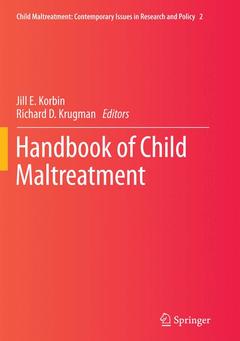Handbook of Child Maltreatment, Softcover reprint of the original 1st ed. 2014 Child Maltreatment Series, Vol. 2
Coordonnateurs : Korbin Jill E., Krugman Richard D.

Introduction: Jill E. Korbin and Richard D. Krugman.- PART I. CHILD MALTREATMENT: WHAT IS IT?.- Chapter 1: Trends in Child Abuse Reporting; Andrea Sedlak and Raquel Ellis.- Chapter 2: Child Neglect: Challenges and Controversies; Laura Proctor and Howard Dubowitz.- Chapter 3: Current Issues in Physical Abuse; Vincent Palusci.- Chapter 4: Child Sexual Abuse: The History, Current State of the Art and the Challenges for the Future – a Pediatric Perspective; Astrid Heger.- Chapter 5: Fatal Child Abuse; Scott Krugman and Wendy Lane.- PART II. CHILD MALTREATMENT: WHY DOES IT OCCUR?.- Chapter 6: A Multidimensional View of Continuity in Intergenerational Transmission of Child Maltreatment: Sara Bezenski, Tuppett Yates and Byron Egeland.- Chapter 7: Poverty and Child Maltreatment; F. Brett Drake and Melissa Jonson-Reid.- Chapter 8: The Evolving Understanding of Disproportionality and Disparities in Child Welfare; Alan Dettlaff.- Chapter 9: Child Maltreatment and Disabilities: Increased Risk? Angelo Giardino, Eileen R. Giardino and Reena Isaac.- Chapter 10: Addressing Intimate Partner Violence and Child Maltreatment: Challenges and Opportunities; Jeanne Alhusen, Grace Ho, Kamala Smith and Jacqueline Campbell.- PART III. CHILD MALTREATMENT: WHAT ARE THE CONSEQUENCES?.- Chapter 11: Neurobiological Consequences of Neglect and Abuse; Kristin Bernard, Teresa Lind and Mary Dozier.- Chapter 12: Longterm Consequences of Child Maltreatment; Cathy Spatz Widom.- PART IV. CHILD MALTREATMENT: WHAT CAN AND SHOULD WE DO ABOUT IT?.- Chapter 13: Beyond Maltreatment: Developing Support for Children in Multiproblem Families; Michael Wald.- Prevention.- Chapter 14: Sustaining Progress in Preventing Child Maltreatment: A Transformative Challenge; Deborah Daro and Genevieve Benedetti.- Chapter 15: Community-Level Prevention of Child Maltreatment; Beth Molnar and William Beardslee.- Chapter 16: The Public Health Approach to the Prevention of Child Maltreatment; Patricia Hashima.- Chapter17: Strong Communities: A Community-wide Approach to Prevention of Child Maltreatment; Gary Melton.- Chapter 18: Prevention of Child Maltreatment: The Problem of Resource Allocation; Fred Wulczyn, Sara Feldman, Sarah McCue Horwitz and Lily Alpert.-Treatment and Intervention.- Chapter 19: Empirically Based Treatments for Maltreated Children: A Developmental Perspective; Susan Timmer and Anthony Urquiza.- Chapter 20: Psychosocial Consequences and Treatments for Maltreated Children; Monica Fitzgerald and Lucy Berliner.- Chapter 21: Foster Care and Child Well-Being: A Promise Whose Time Has Come; Heather Taussig and Tali Raviv.- Chapter 22: Addressing Child Maltreatment through Mutual Support and Self-Help Among Parents; Arlene Andrews.- Chapter 23: Nonoffending Mothers of Sexually Abused Children; Viola Vaughan-Eden.- Chapter 24: Beyond Investigations: Differential Response in Child Protection Services; Tamara Fuller.- Chapter 25: Decisions to Protect Children: A Decision Making Ecology; John Fluke, Donald Baumann, Len Dalgleish and Homer Kern.- Legal Perspectives.- Chapter 26: Using Law to Identify and Manage Child Maltreatment; Ben Mathews and Donald Bross.- Chapter 27: Judicial Issues in Child Maltreatment; Jesse Russell, Nancy Miller and Michael Nash.- Chapter 28: Law Enforcement’s Evolving Mission to Protect Children; Stephanie Stronks Knapp.- PART V. CHILD MALTREATMENT: IS IT THE SAME EVERYWHERE?.- Chapter 29: Child Maltreatment as a Problem in International Law; Robin Kimbrough-Melton.- Chapter 30: Child Maltreatment and Global Mental Health: Biocultural Perspectives; Brandon Kohrt.
Jill E. Korbin, Ph.D. is Associate Dean, Professor of Anthropology, Director of the Schubert Center for Child Studies, and Co-Director of the Childhood Studies Program in the College of Arts and Sciences at Case Western Reserve University. Korbin earned her Ph.D. in 1978 from the University of California at Los Angeles. Her awards include the Margaret Mead Award (1986) from the American Anthropological Association and the Society for Applied Anthropology; a Congressional Science Fellowship (1985-86 in the Office of Senator Bill Bradley) through the American Association for the Advancement of Science and the Society for Research in Child Development; the Wittke Award for Excellence in Undergraduate Teaching at Case Western Reserve University (1992); and a Fulbright Senior Specialist Award (2005). Korbin served on the National Research Council’s Panel on Research on Child Abuse and Neglect, and the Institute of Medicine’s Panel on Pathophysiology and Prevention of Adolescent and Adult Suicide. Korbin served for multiple years on the Executive Committee of the International Society for Prevention of Child Abuse and Neglect (ISPCAN), and as an Associate Editor, Book Review Editor, or Editorial Board Member for Child Abuse and Neglect: The International Journal. Korbin has published numerous articles on child maltreatment in relationship to culture and context, and edited the first volume on culture and child maltreatment, Child Abuse and Neglect: Cross-Cultural Perspectives (1981, University of California Press.) Korbin’s research interests include culture and human development; cultural, medical and psychological anthropology; neighborhood, community, and contextual influences on children and families; child maltreatment; and child and adolescent well-being.
Richard D. Krugman, MD, is Professor of Pediatrics, Vice Chancellor for Health Affairs and Dean of the University of Colorado School of Medicine. He served as Directorof the C. Henr
Date de parution : 09-2016
Ouvrage de 588 p.
17.8x25.4 cm
Thèmes de Handbook of Child Maltreatment :
Mots-clés :
Child and Social Neglect; Complexity of Child Abuse and Child Neglect; Current Issues in Physical Abuse and Child Sexual Abuse; Disproportionality and Disparities in Child Welfare; Empirically Based Treatments for Maltreated Children; Evidence Based Treatment; Intergenerational Transmission of Child Maltreatment; Judicial Issues in Child Maltreatment; Maltreatment Prevention; Neurobiological Consequences of Neglect and Abuse; Poverty and Child Maltreatment; Prevention of Child Maltreatment; Trends in Child Abuse Reporting



